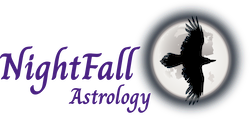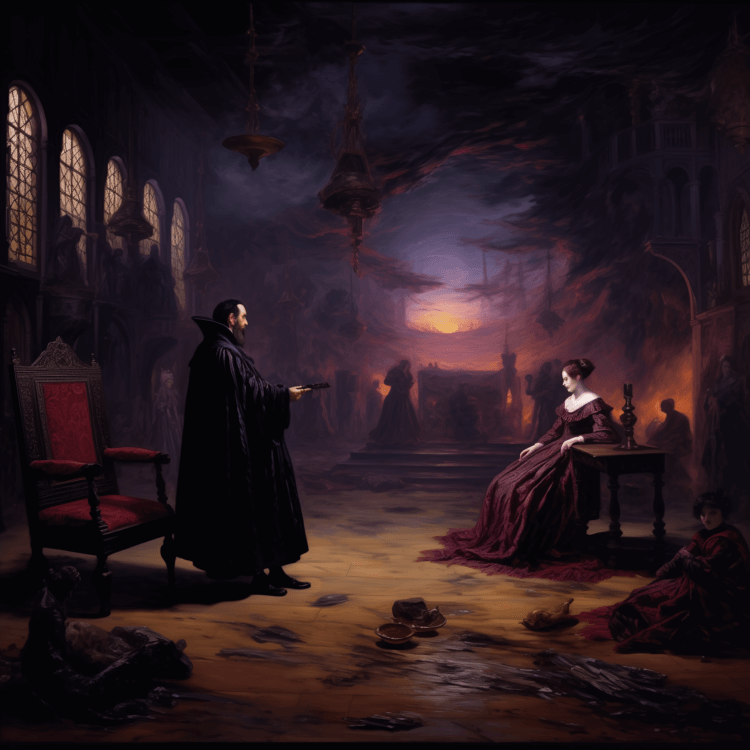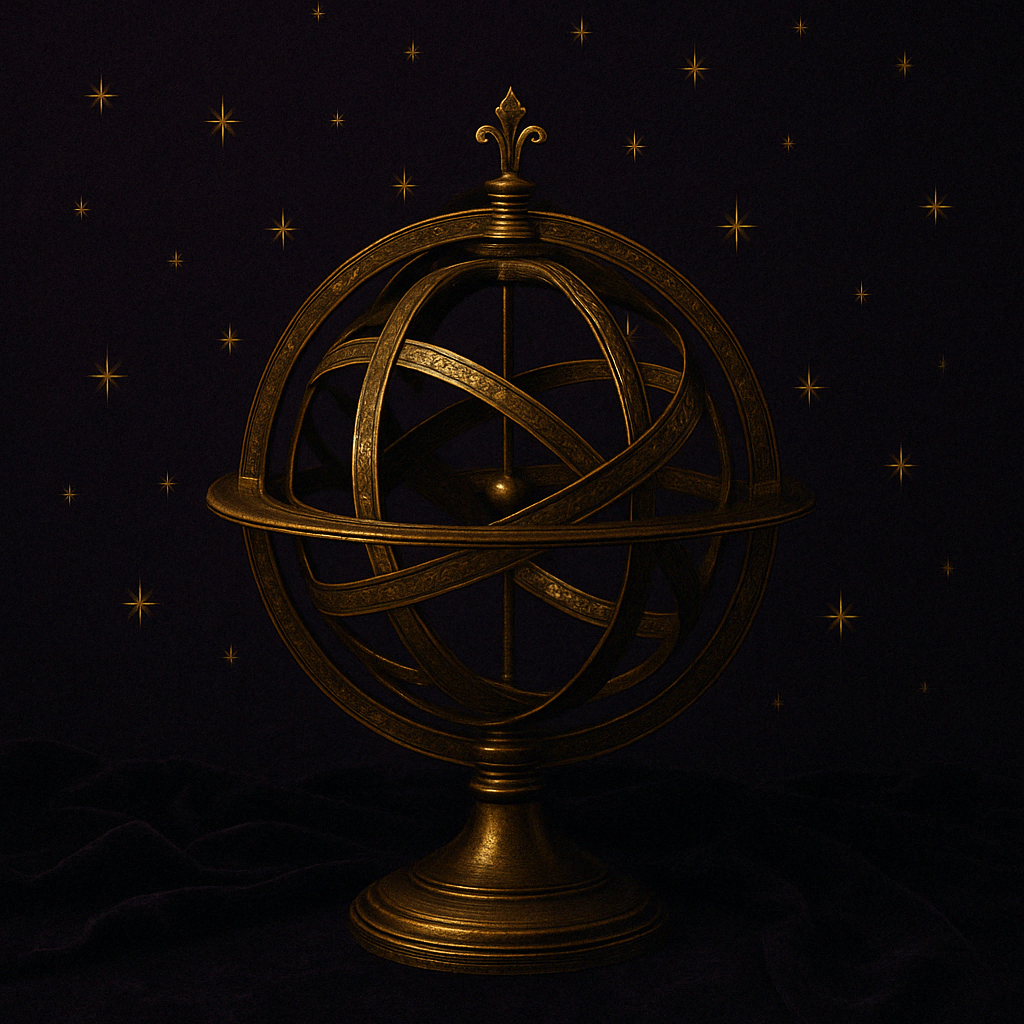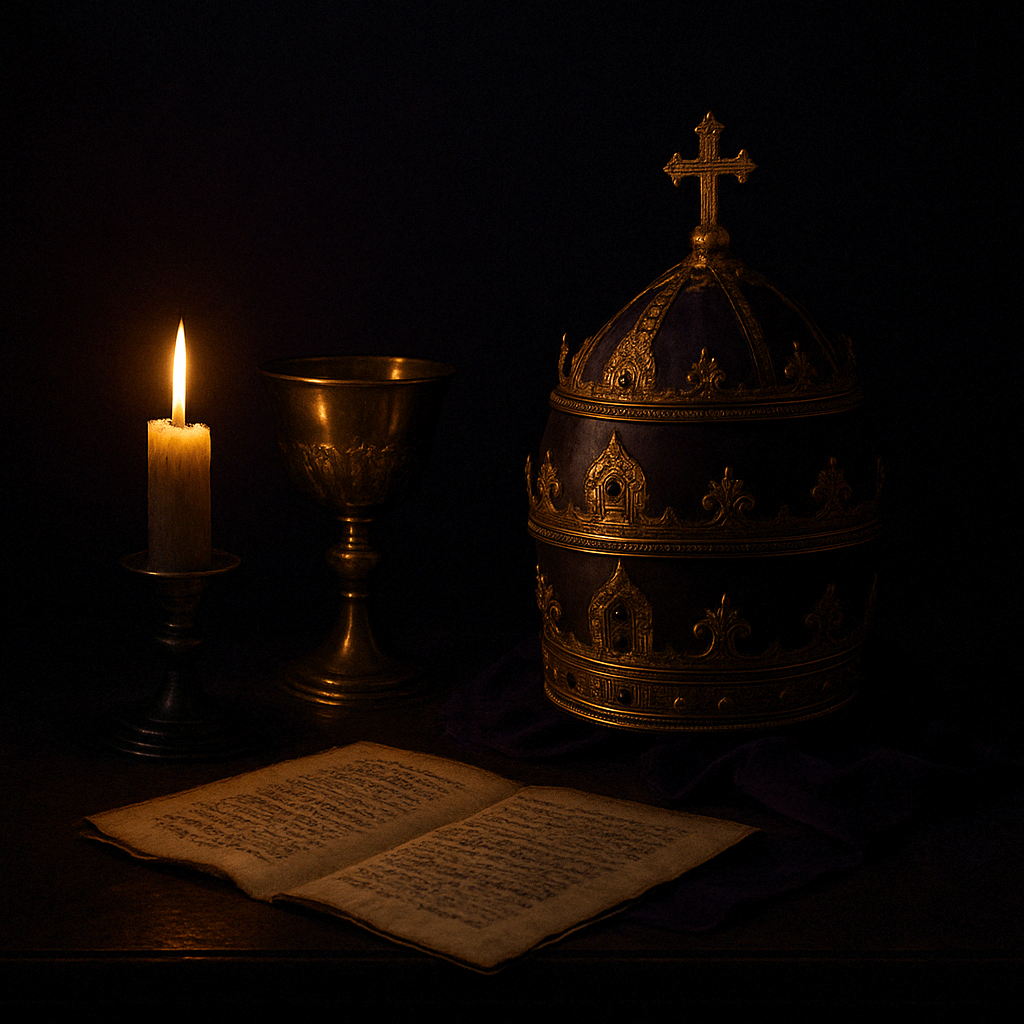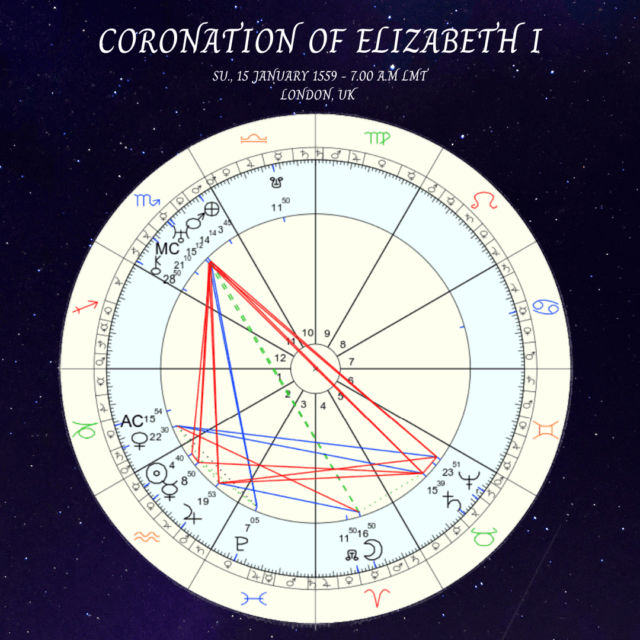No products in the basket.
Astrology in the Court of Elizabeth I: John Dee and the Politics of the Stars
Dear NightFall Astrology readers,
In Elizabethan England, a period distinguished by significant cultural and political evolution, astrology occupied a position of both fascination and authority. This era, under the reign of Queen Elizabeth I, was a time marked by a flourishing of the arts and sciences, where empirical inquiry coalesced with the mystical. Astrology, often relegated in contemporary views to the peripheries of superstition, was then a discipline of considerable gravity and respect. It informed not only personal lives but also played a critical role in shaping statecraft at the highest levels. Court astrologers, adept in interpreting celestial patterns, provided counsel on issues as diverse as health and royal alliances, manifesting a belief system in which the movements of the heavens and human destinies were seen as closely connected.
John Dee stood as a prominent figure in this world where celestial and earthly affairs were closely intertwined. A polymath and scholar, Dee’s expertise extended beyond astrology to encompass alchemy, mathematics, and a role as an esteemed advisor to Queen Elizabeth I. His life and work were emblematic of the Renaissance ethos — a pursuit of knowledge that seamlessly blended scientific inquiry with esoteric exploration. Dee’s influence within the Elizabethan court was substantial; his astrological guidance was sought by none other than the Queen herself, underscoring his mastery and the period’s deep-seated esteem for astrological wisdom. Dee’s contributions transcended mere horoscope casting; he was a pivotal figure in state affairs and a leading light in the intellectual and mystical explorations of his time.
This article intends to dissect the complex interplay of John Dee’s astrological endeavours with the political and cultural landscape of Elizabethan England. It endeavours to reveal how his insights, derived from the stars, resonated within the realms of power, shaping decisions that charted the course of English history. A deeper investigation into Dee’s life and his influential position in the Elizabethan court paints a vivid picture of an era where astrology and politics were inextricably linked, overseen by one of history’s most enigmatic astrologers.
I. The Elizabethan Worldview and Astrology:
The Elizabethan era, a pivotal period in English history, was marked by significant socio-political and cultural transformations. Spanning the late 16th and early 17th centuries, this epoch, under the reign of Queen Elizabeth I (1558-1603), saw England ascend as a major European power in areas ranging from politics to the arts (Wilson, Derek, “Elizabethan Society: High and Low Life, 1558-1603”, Pimlico, 2014). The era was characterized by the complexities of religious reformation, burgeoning exploration, and a remarkable flowering of English literature and drama, epitomised by figures such as Shakespeare and Marlowe.
At the heart of this era’s ethos was the profound religious transformation that England underwent. The Elizabethan era, a period under Queen Elizabeth I’s reign, saw the consolidation of Protestantism as the national faith, a significant shift that followed the break from the Roman Catholic Church initiated by Henry VIII. This reformation began as a political and personal maneuver by Henry VIII but evolved into a movement deeply influencing England’s religious, political, and cultural landscape (MacCulloch, Diarmaid, “The Reformation: A History”, Penguin Books, 2004).
This shift towards Protestantism involved not only a divergence from the doctrines of the Catholic Church but also the establishment of the Church of England with the monarch as its head. The move away from Catholic practices, like the veneration of saints and the authority of the Pope, led to a radical change in religious practice and perception within society. The Protestant emphasis on scripture and a personal relationship with the divine paradoxically created an environment where astrology and the occult gained prominence, aligning with the era’s fascination with understanding God’s will and the natural world (Thomas, Keith, “Religion and the Decline of Magic: Studies in Popular Beliefs in Sixteenth and Seventeenth-Century England”, Penguin Books, 1971).
Astrology, during this period, found itself at the intersection of support and scepticism. While some Protestant reformers criticised it as conflicting with Christian doctrines, many others embraced it as a means to interpret divine signs. This mirrored the broader Renaissance pursuit of knowledge, including an understanding of the cosmos and its perceived influence on earthly affairs (Yates, Frances A., “The Occult Philosophy in the Elizabethan Age”, Routledge, 1979). The era was thus marked by a complex relationship with astrology, reflective of the broader societal transformations and tensions resulting from the seismic shifts in religious thought and practice.
Astrology in Elizabethan society was more than a fringe belief; it was a respected discipline interwoven with daily life. The prevailing geocentric view of the universe, placing Earth at the centre with the heavens revolving around it, naturally supported astrological practices (Kuhn, Thomas S., “The Copernican Revolution: Planetary Astronomy in the Development of Western Thought”, Harvard University Press, 1957). Astrology was perceived as a science that could unlock aspects of God’s plan, blending religious faith with empirical observation.
The populace, from the commoners to the nobility, frequently sought astrological guidance. Astrologers provided predictions on health, ventures, and even agricultural planning (North, John D., “Horoscopes and History”, Warburg Institute, 1986). Almanacs, brimming with astrological content, were widely popular, offering practical advice and predictions (Capp, Bernard, “Astrology and the Popular Press: English Almanacs 1500-1800”, Faber and Faber, 1979).
In the royal court, astrology’s role was pronounced, particularly in governance and decision-making. Monarchs and advisors often relied on astrological counsel for critical state matters, including military campaigns and royal alliances. Queen Elizabeth I herself is documented to have consulted astrologers, notably John Dee, highlighting the influence of astrology in state affairs (French, Peter J., “John Dee: The World of an Elizabethan Magus”, Routledge & Kegan Paul, 1972). The selection of her coronation date, influenced by astrological considerations, underscores the significance of celestial guidance in royal decisions (Yates, Frances A., “Astrology in the Renaissance: The Zodiac of Life”, Routledge & Kegan Paul, 1983).
Despite its prominence, astrology faced critiques with the rise of empirical reasoning and the scientific method, characteristic of the later Renaissance. Figures like Francis Bacon advocated for a more empirical approach to understanding the natural world, gradually diminishing the stronghold of astrology (Bacon, Francis, “The Advancement of Learning”, Clarendon Press, 1605).
In summary, astrology in the Elizabethan era was a potent force, deeply embedded within the socio-political and cultural fabric of the time. Its role as a tool for personal guidance and statecraft mirrors a worldview where celestial and terrestrial realms were seen as interconnected, rooted in the era’s religious and philosophical underpinnings.
II. John Dee – Astrologer, Alchemist, and Scholar:
John Dee, a figure synonymous with the intellectual and mystical pursuits of the Elizabethan era, was a man whose life and work bridged the realms of the practical and the metaphysical. Born in London in 1527, Dee’s early life was marked by academic excellence. He attended St. John’s College, Cambridge, where he excelled, particularly in mathematics and astronomy (Clucas, Stephen, “John Dee: Interdisciplinary Studies in English Renaissance Thought”, Springer, 2006). His prodigious intellect led him to further studies in Europe, where he engaged with many of the continent’s leading scholars.
Upon returning to England, Dee’s reputation as a scholar grew, attracting the attention of the royal court. He established himself as an expert in various fields, particularly mathematics and navigation. Dee’s contributions to these areas were significant; he authored several texts, including “The Mathematicall Praeface to the Elements of Geometrie of Euclid of Megara” (1570), which was a comprehensive overview of mathematics as it was understood at that time (Dee, John, “The Mathematicall Praeface to the Elements of Geometrie of Euclid of Megara”, 1570). In navigation, his expertise was instrumental in the planning of voyages of exploration, particularly in helping to lay the groundwork for English expansion and colonialism (Turner, Anthony, “Elizabethan Instrument Makers: The Origins of the London Trade in Precision Instrument Making”, OUP, 2000).
“Who does not understand should either learn, or be silent.” – John Dee
Dee’s fascination with the occult and astrology was as profound as his commitment to scientific inquiry. He amassed one of the largest libraries in England, containing works on a wide array of subjects, including the mystical and esoteric. His interests in these areas led to the publication of “Monas Hieroglyphica” (1564), a work which explored symbolic language and was steeped in alchemical and Hermetic traditions (Dee, John, “Monas Hieroglyphica”, 1564). Dee believed that through understanding these symbols, one could gain insight into the divine and natural order of the universe.
Astrology was a key component of Dee’s scholarly pursuits. He was well-versed in the astrological practices of the time and produced astrological charts and forecasts, both for personal use and for the royal court. His consultations with Queen Elizabeth I are well-documented; he provided astrological advice on various matters, including the selection of auspicious dates for significant events (French, Peter J., “John Dee: The World of an Elizabethan Magus”, Routledge & Kegan Paul, 1972). Dee’s astrological practices were not isolated from his scientific work; rather, he saw them as complementary, reflecting the Renaissance view of the world where science, mysticism, and astrology were interlinked (Sherman, William H., “John Dee: The Politics of Reading and Writing in the English Renaissance”, University of Massachusetts Press, 1995).
In addition to his astrological and scientific pursuits, Dee was deeply interested in spiritual and mystical experiences. He engaged in a series of ‘spiritual conferences’ or ‘angelic conversations’ with the medium Edward Kelley, which he meticulously documented. These experiences, which involved attempts to communicate with angels, were part of Dee’s broader quest to understand the divine mysteries of the universe (Harkness, Deborah E., “John Dee’s Conversations with Angels: Cabala, Alchemy, and the End of Nature”, Cambridge University Press, 1999).
John Dee’s contributions to science, mathematics, and navigation were monumental, yet his engagement with astrology and the occult reveals a more nuanced picture of a man deeply embedded in the intellectual currents of his time. His life’s work reflects the Elizabethan era’s complex relationship with knowledge, where boundaries between the scientific and the mystical were fluid and often overlapping.
III. Dee and Elizabeth I – A Celestial Relationship:
The relationship between John Dee and Queen Elizabeth I was one of the most intriguing aspects of the Elizabethan court. It was a unique blend of the political, intellectual, and mystical. Dee, a respected scholar and astrologer, served as an advisor to the Queen, a role that reflected the era’s intricate connection between astrology and governance (French, Peter J., “John Dee: The World of an Elizabethan Magus”, Routledge & Kegan Paul, 1972).
Dee’s contribution to Elizabethan politics was notably exemplified in his astrological consultations for the planning of Queen Elizabeth I’s coronation. The coronation chart for 15th January 1559, set for 7:00 a.m. (the time of the coronation service) LMT in London, was carefully elected, according to the Julian calendar then in use, as the Gregorian calendar was not recognised by Protestant England at this time. The astrological chart for this momentous occasion presented a calculated arrangement of celestial bodies, signifying a reign of both stability and benevolence.
At NightFall Astrology, we adhere to the tradition of employing whole sign houses. The chart below, thus, does not utilise the later developed Placidus House System. The ancients, including those who would have been contemporaneous with Dee, would have looked to whole sign houses, or perhaps Porphyry Houses, to determine the exact house cusps, with a strong preference for the former system.
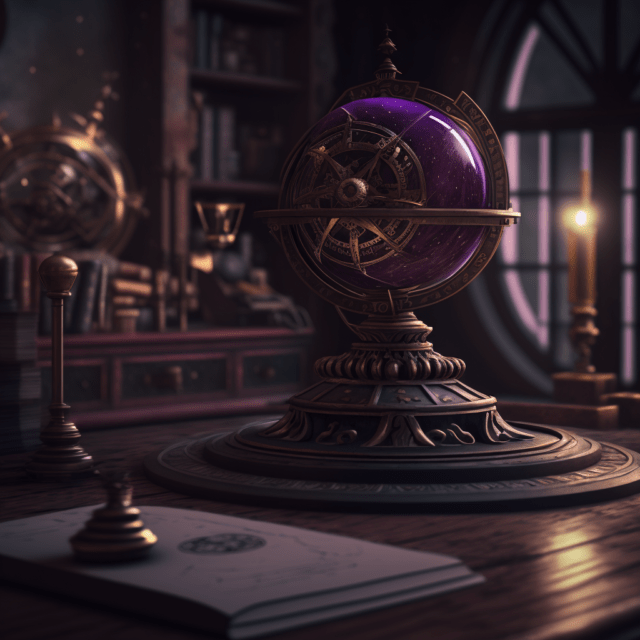
The chart’s ascendant in Capricorn, with Venus, the greater benefic in this nocturnal chart, in close conjunction to it, signified a reign that would be characterised by grace, diplomacy, and favour. Venus’s proximity to the ascendant was likely interpreted as a portent of Elizabeth’s image as a beloved and prosperous ruler.
Venus, as the nocturnal benefic, in a superior square to the Moon in Aries in the fourth house, was an aspect of compelling action. In the context of Hellenistic astrology, this superior square, particularly from Venus, would not be seen as a malefic influence but rather as an aspect that provides dynamic energy, beneficial challenges, and opportunities for growth. The Moon, the sect light, in the foundational fourth house, signifies the heart of the realm and the essence of the Queen’s dominion. This challenging aspect from Venus would have been seen as motivating Elizabeth to assert her will with grace and to secure her country’s prosperity with a benefic influence.
In this chart, Saturn, the greater malefic in a nocturnal chart and ruler of the ascendant, resided in Taurus in the fifth house. This position might have indicated Elizabeth’s choice to prioritise governance over personal lineage. However, the harmonious trine from Venus to Saturn would have mitigated harsher implications, suggesting a strengthening of her reign through her sacrifices.
Intriguingly, in Elizabeth I’s coronation chart, Jupiter, the benefic out of sect, positioned in Aquarius in the second house, formed a tense square aspect with Saturn in Taurus in the fifth house and with Mars, which was in its domicile in Scorpio, in the eleventh house, along with the Midheaven. This intricate configuration suggested nuanced financial challenges or tensions regarding resources and values, potentially linked to Elizabeth’s political and societal ambitions. The square from Jupiter to Mars, with Mars robustly placed in its domicile, implied a tension between financial prudence and ambitious societal reforms or military initiatives. The Mars in Scorpio position, especially in the eleventh house of hopes, aspirations, and wider societal objectives, indicated that Elizabeth’s reign might be marked by vigorous and strategic actions in the realms of public policy and national defence. This placement of Mars could imply that any tensions arising from these aspects would be resolved through decisive, strategic action and martial vigour, contributing significantly to the Queen’s image as a formidable leader.
The square between Jupiter in the second house and Saturn in the fifth house suggested a delicate balance between the nation’s financial stability and the demands of Elizabeth’s personal sacrifices and public responsibilities. Jupiter’s placement in the second house indicated potential for financial growth and expansion, yet its square to Saturn hinted at the need for prudence and careful management of resources, especially in matters related to entertainment, artistic expressions, and issues concerning heirs or succession, as denoted by the fifth house. This aspect might have been interpreted as a need to judiciously balance the expenditure on cultural and leisure pursuits with the practical necessities of governance.
Furthermore, the opposition between Saturn and Mars, with Mars positioned in its domicile in Scorpio in the whole-sign eleventh house, along with the Midheaven, suggested underlying tensions in Elizabeth’s reign regarding her ambitions and societal expectations. Mars’ placement in Scorpio, being in its domicile and the malefic of the sect light, would confer a constructive and potent energy to the Queen’s efforts to navigate these challenges. This alignment indicated that while there may be significant pressures and conflicts in achieving her societal and political aspirations, the strategic and assertive qualities of a well-placed Mars would be key in overcoming these obstacles, reinforcing her stature as a resolute and powerful monarch.
In the context of Elizabeth I’s coronation chart, these aspects formed a complex web of celestial influences. John Dee, in his interpretation, would likely have considered these alignments as indicative of a reign where financial astuteness, strategic diplomacy, and decisive military action would play pivotal roles.
The Moon in Aries in the fourth house, conjunct the North Node, suggested a new beginning and a significant step in establishing her rule. The Moon’s sextile to Jupiter in the second house, part of a stellium with the Sun and an invisible Mercury, indicated auspicious signs for financial stability, intellectual prowess, and effective communication with her subjects. The Sun and Mercury in the second house would have been interpreted as strong indicators of a prosperous and resourceful reign, despite Mercury’s combust state.
While John Dee’s precise interpretation of these alignments is not recorded, it is conceivable that he would have seen the chart as indicating a reign of balance between public duty, signified by Capricorn, and the private sacrifices, symbolised by Saturn in the fifth house. The aspects involving Venus and Jupiter, despite their challenges, would have been seen as ultimately contributing to a stable and prosperous reign for Elizabeth I.
This reconstruction of Dee’s analysis, based on the astrological tradition of the time with its reliance on the seven traditional planets and whole sign houses, is an informed speculation of how he might have read these celestial omens, signifying celestial support for the Queen’s sovereignty.
Another instance of Dee’s astrological influence was during the planning of exploratory expeditions. He provided astrological advice for voyages, including those of Sir Francis Drake. His calculations were employed to choose propitious dates for the commencement of these expeditions, aimed at maximising the likelihood of success (Parry, Glyn, “The Arch-Conjuror of England: John Dee”, Yale University Press, 2012). Dee’s involvement exemplified the belief in astrology as a guiding force in navigation and exploration, a critical aspect of Elizabethan expansionism.
Dee’s astrological expertise also extended to matters of state security. During the tumultuous period of the Spanish Armada in 1588, Dee’s advice was sought to determine the most auspicious dates for military actions. His readings and predictions were part of the strategic considerations, reflecting the integration of astrology into military planning (Harkness, Deborah E., “The Jewel House: Elizabethan London and the Scientific Revolution”, Yale University Press, 2007). This intervention illustrates how astrology was not merely a personal or philosophical pursuit but a practical tool in the hands of those governing the realm.
The relationship between Dee and Elizabeth I was not solely confined to the dispensation of astrological advice. Dee’s intellectual pursuits in alchemy, mathematics, and navigation also found favour with the Queen, who supported many of his scholarly endeavours. This patronage was indicative of Elizabeth’s broader interest in and support for the sciences and the mystical arts, a hallmark of her reign (Sherman, William H., “John Dee: The Politics of Reading and Writing in the English Renaissance”, University of Massachusetts Press, 1995).
Dee’s influence, however, was not without its challenges. The period was marked by religious and political tensions, and Dee’s practices occasionally drew suspicion and criticism, reflecting the complex and often precarious position of astrologers in the court. Despite these challenges, Dee maintained his status as a trusted advisor and astrologer to the Queen, testament to both his skill and the importance placed on astrology in Elizabethan governance (Clulee, Nicholas H., “John Dee’s Natural Philosophy: Between Science and Religion”, Routledge, 1988).
In summary, the relationship between John Dee and Queen Elizabeth I was a multifaceted one, intertwining the political, intellectual, and mystical realms. Dee’s role as an astrologer and advisor to the Queen was pivotal, influencing key decisions in Elizabethan politics. The specific incidents where Dee’s astrological advice played a role, from the selection of the coronation date to strategic decisions during the Spanish Armada, highlight the significant impact of astrology on the governance and policies of the time. Dee’s legacy, therefore, is not just as a scholar but as a key figure in the political and mystical landscape of Elizabethan England.
IV. Dee’s Mastery of Espionage and Political Strategy:
In the complex world of Elizabethan politics, espionage played a pivotal role, with John Dee emerging as a key player in the intricate game of intelligence and statecraft. Known predominantly for his contributions to astrology and science, Dee’s involvement in espionage was equally significant and often shrouded in mystery. One of the most intriguing aspects of his espionage work was his code name: ‘007’. This designation, later immortalised by Ian Fleming in his James Bond novels, was originally attributed to Dee, symbolising his status as a trusted secret agent for Queen Elizabeth I (French, Peter J., “John Dee: The World of an Elizabethan Magus”, Routledge & Kegan Paul, 1972).
Dee’s code name ‘007’ held a particular significance. The ’00’ prefix indicated that he was a trusted agent with the licence to carry out secret missions on behalf of the Queen, while the ‘7’ was said to represent Dee’s use of a special symbol to secure his communications, resembling a pair of spectacles. This symbol was not just a mark of secrecy but also a reflection of Dee’s innovative approach to cryptography and intelligence (Woolley, Benjamin, “The Queen’s Conjuror: The Science and Magic of Dr. John Dee, Advisor to Queen Elizabeth I”, Henry Holt and Co., 2001).
The Elizabethan era was a time of covert operations and intelligence networks, crucial in the volatile political landscape of 16th-century Europe. Dee, with his scholarly and astrological expertise, was ideally placed to serve the Crown in this capacity. His diplomatic missions across Europe, ostensibly for scholarly pursuit, doubled as intelligence-gathering operations, collecting valuable information on political alliances and military preparations.
John Dee’s counsel in the realm of international relations and policy decisions played a crucial role in shaping the Elizabethan approach to foreign policy. While his political advice is less documented than his extensive astrological and scientific work, its influence was nevertheless pivotal in the realms of diplomacy and statecraft. Dee’s insights were particularly invaluable in the negotiation of treaties and alliances, an area where the subtleties of language and intention are paramount. His deep understanding of the European political landscape, gleaned through his covert espionage activities, provided the English Crown with a nuanced perspective that was critical in navigating the intricate web of 16th-century European politics (Sherman, William H., “John Dee: The Politics of Reading and Writing in the English Renaissance”, University of Massachusetts Press, 1995).
Dee’s contributions extended beyond mere intelligence gathering. His role as a diplomat and advisor saw him engaging with key political figures across Europe, leveraging his scholarly reputation to gain access to influential courts and councils. In these settings, Dee was able to observe and report back on the subtleties of foreign policy and courtly intrigue, providing Queen Elizabeth I and her advisers with a level of insight that was not readily available from conventional sources.
His acute understanding of the shifting alliances and power dynamics within European courts was crucial in advising the Queen on how to position England in this complex landscape. Dee’s advice likely influenced the timing and nature of Elizabeth’s diplomatic overtures, as well as her responses to the manoeuvrings of other monarchs and states. His ability to decipher the undercurrents of political discourse and his awareness of the hidden motives and intentions of other European powers were instrumental in informing the English approach to diplomacy.
Moreover, Dee’s knowledge of scientific and technological advancements, combined with his understanding of political affairs, enabled him to offer advice on matters ranging from naval strategy to trade negotiations. His involvement in these diverse areas underlines the multifaceted nature of Elizabethan statecraft, where science, intelligence, and political acumen were intertwined.
A defining moment in Dee’s career as a spy came during the Spanish Armada crisis in 1588. While his astrological readings were a factor, it was his role in the intelligence network that proved crucial. Dee’s gathering and relaying of information about the Spanish fleet’s movements provided a significant strategic advantage to the English forces. His deciphering and communication of coded messages were instrumental in coordinating the defensive actions that ultimately led to the Armada’s defeat (Alford, Stephen, “The Watchers: A Secret History of the Reign of Elizabeth I”, Bloomsbury, 2012). Dee’s work during this period exemplified the importance of intelligence in warfare and the value of having a skilled operative like ‘007’ in the service of the Crown.
Dee’s legacy in espionage and political strategy is a testament to the multifaceted nature of his talents. His pioneering methods in intelligence gathering, coupled with his application of scientific and astrological knowledge in political strategy, influenced the development of modern espionage techniques. His involvement in the political intrigues of his time underlines the crucial role espionage played in the maintenance and exercise of power during the Elizabethan era.
V. Legacy and Impact of Dee’s Astrological Practices:
In the annals of Elizabethan England, few figures cast as long a shadow as John Dee. His involvement in the realms of politics, astrology, and espionage left an indelible mark not only on his era but also on the subsequent perception of the interplay between science and the mystical. Dee’s later years and his enduring legacy are a testament to the complex relationship between knowledge and power in Elizabethan culture (French, Peter J., “John Dee: The World of an Elizabethan Magus”, Routledge & Kegan Paul, 1972).
John Dee’s astrological practices left an indelible mark on Elizabethan culture, embodying the era’s intellectual curiosity and its amalgamation of the mystical with the empirical. Dee’s approach to astrology was not only innovative but also deeply influential. He combined rigorous mathematical calculations with mystical and symbolic interpretations, creating a synthesis that was both practical and profound. This methodology resonated with the Elizabethan zeitgeist, which was characterised by a burgeoning interest in the occult and the celestial. The period saw the stars and their movements as integral to understanding not only the natural world but also human affairs, and Dee was at the forefront of this movement (Sherman, William H., “John Dee: The Politics of Reading and Writing in the English Renaissance”, University of Massachusetts Press, 1995).
Dee’s astrological work, particularly his detailed astrological charts and predictions, was reflective of a broader Elizabethan fascination with uncovering the hidden order of the universe. His writings on astrology, such as ‘Propaedeumata Aphoristica’ (1558) and ‘Monas Hieroglyphica’ (1564), were not mere forecasts but complex treatises that explored the philosophical and metaphysical dimensions of the stars and their influences. These works, steeped in symbolism and astrological theory, were pivotal in elevating astrology from a practice of divination to an intellectual pursuit that bridged the mystical with the emerging scientific discourse of the time.
The influence of Dee’s astrological practices extended well beyond the borders of Elizabethan England. His works were studied and referenced by subsequent generations of astrologers and scholars across Europe. Dee’s integration of astrology with other scientific disciplines, such as navigation and cartography, set the stage for a more systematic approach to celestial studies that would emerge in the later Renaissance and early modern period. His astrological treatises provided a foundation for later scholars to build upon, influencing the development of astronomy and the eventual shift towards a more empirical understanding of the heavens.
Furthermore, Dee’s astrological practices had a significant impact on the broader cultural and artistic realms. His ideas permeated the works of contemporary playwrights, poets, and artists, who found inspiration in the mystical and symbolic aspects of astrology that Dee so adeptly explored. The Elizabethan era’s literature and art were often imbued with astrological motifs and references, reflecting the period’s deep fascination with the cosmos and its perceived influence on human life.
In contemporary times, there has been a reassessment of Dee’s contributions to both astrology and politics. Historians and scholars now view Dee not merely as an occultist but as a pivotal figure in the scientific and intellectual community of his time. The modern understanding of Dee recognises the depth and breadth of his knowledge and his attempts to reconcile different fields of study. His work is now seen as part of the larger narrative of the development of scientific thought, particularly in the fields of navigation, mathematics, and astronomy, as well as his contributions to statecraft and diplomacy (Harkness, Deborah E., “The Jewel House: Elizabethan London and the Scientific Revolution”, Yale University Press, 2007).
John Dee’s legacy is a complex tapestry of scientific inquiry, mystical exploration, and political involvement. His later years and the posthumous treatment of his work reflect the shifting attitudes towards science and the supernatural in the post-Elizabethan era. Dee’s contributions to astrology and politics, once overshadowed by his more esoteric pursuits, are now being re-evaluated, highlighting his role as a bridge between the ancient and the modern worlds. His life and work exemplify the multifaceted nature of knowledge in the Elizabethan age, an era that laid many of the foundations for our contemporary understanding of the universe and our place within it.
The life and work of John Dee provide a fascinating window into the intricate relationship between astrology, politics, and culture in Elizabethan England. Dee’s multifaceted career, which spanned the realms of the celestial, the political, and the mystical, exemplifies the era’s complex interplay of knowledge, power, and belief. His contributions to astrology were not confined to the esoteric but were intimately intertwined with the political machinations and cultural developments of his time. Dee’s role as a court astrologer, advisor to Queen Elizabeth I, and participant in the clandestine world of espionage reflects the multifarious ways in which astrology was woven into the fabric of Elizabethan society.
In retrospect, John Dee’s work offers a unique perspective on the historical role of astrology. It challenges modern perceptions of astrology as merely a superstitious or marginal practice. Instead, Dee’s astrological pursuits, integrated with his scholarly and diplomatic endeavours, highlight astrology’s significance as a comprehensive discipline that influenced decisions at the highest levels of power. His legacy underlines the fact that astrology, during the Renaissance, was a serious intellectual pursuit, deeply embedded in the cultural, political, and scientific discourses of the time.
Dee’s life and work, thus, serve as a testament to the rich tapestry of Elizabethan thought, where astrology was as much a part of the pursuit of knowledge as were the emerging sciences. His contributions transcend the boundaries of his era, offering insights into the evolution of thought and the enduring quest to understand our place in the cosmos. John Dee’s story is a reminder of the value of looking beyond the horizons of our current understanding and appreciating the historical contexts that shape our perception of disciplines like astrology.
Thank you for reading.
Fuel my caffeine addiction and spark my productivity by clicking that ‘Buy me a coffee’ button—because nothing says ‘I love this blog’ like a hot cup of java!
Buy Me a Coffee
Your Astrologer – Theodora NightFall ~
Your next 4 steps (they’re all essential but non-cumulative):
Follow me on Facebook & Instagram!
Subscribe to my free newsletter, “NightFall Insiders”, and receive my exclusive daily forecasts, weekly horoscopes, in-depth educational articles, updates, and special offers delivered directly in your inbox!
Purchase one of my super concise & accurate mini-readings that will answer your most pressing Astro questions within 5 days max!
Book a LIVE Astro consultation with me!
